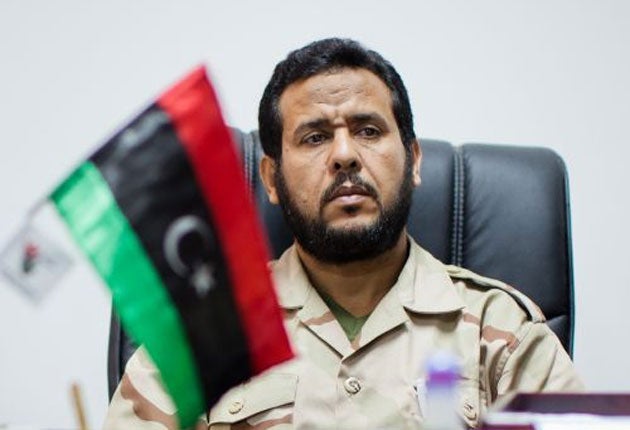
Your support helps us to tell the story
From reproductive rights to climate change to Big Tech, The Independent is on the ground when the story is developing. Whether it's investigating the financials of Elon Musk's pro-Trump PAC or producing our latest documentary, 'The A Word', which shines a light on the American women fighting for reproductive rights, we know how important it is to parse out the facts from the messaging.
At such a critical moment in US history, we need reporters on the ground. Your donation allows us to keep sending journalists to speak to both sides of the story.
The Independent is trusted by Americans across the entire political spectrum. And unlike many other quality news outlets, we choose not to lock Americans out of our reporting and analysis with paywalls. We believe quality journalism should be available to everyone, paid for by those who can afford it.
Your support makes all the difference.Asked whether the British Government would apologise to Abdelhakim Belhaj for its part in sending him back to be tortured by Muammar Gaddafi's secret police, a senior UK diplomat in Tripoli said yesterday: "We shall cross that bridge when we come to it."
Britain's role in the rendition of the former prisoner who is now the military chief of the Libyan capital has led to threats of legal action by Mr Belhaj. He told The Independent earlier this week that MI6 officers who had come to interrogate him were fully aware of the abuse he was suffering because he had told them what was happening.
But The Independent can reveal that documents amongst those found at the former Foreign Minister Moussa Koussa's office last week cast Mr Belhaj's status in Tripoli under the Gaddafi regime into further doubt. The tone of some of the MI6 messages to their Libyan counterpart suggests that they may have been led to believe that Mr Belhaj was co-operating.
One letter to Libyan intelligence, found at the offices of Mr Koussa, and signed by the female officer who is believed to have interrogated Mr Belhaj, stated: "Our thanks for the information you provided to us on Abu Zinal, also known as Imumohammed Abu Farsan, from your discussion with Abu Abdullah Al Sadeq [Mr Belhaj's nom de guerre]."
The letter continued: "Will be grateful for any information you might have from Abu Abdullah and other sources."
Another note mentions the release from prison in Britain of a member of the Libyan Islamic Fighting Group (LIFG), named as Kamoka Suhaib [probably an alias] in March 2004. It said: "Given the detention of the head of the Fighting Group in the UK, Abdullah Al Saber, who is currently awaiting sentence having been convicted by a British court, it is possible that Kamoka will assume the role of UK emir of the LIFG. We are content for you to inform Abu Abdullah Al Sadeq [Mr Belhaj] of Kamoka's release."
There were four other messages from British authorities to the Libyans, found in Tripoli ministries, which showed MI6 highly valued the information from Mr Belhaj. None have been found raising concern about his torture.
Mr Belhaj remained keen to stress that he had not "sold out" to the regime even under maltreatment. Despite inducements that the abuse would end if he implicated exiled members of his organisation, as well as other opposition figures abroad, he said he had steadfastly refused to do so. He added: "I told the British, as I told everyone else, that LIFG had no link with al-Qa'ida. I knew making a link would stop what was happening to me, but I was not going to do it."
The British intelligence version is that Mr Belhaj had been co-operating with Libyan authorities and one reason for them attending the meetings with him at the offices of Mr Koussa, the regime's spymaster, was to enquire about his wellbeing.
Mr Belhaj disputes this account. He said he had desperately relayed his plight to the three UK intelligence officers when they came to question him, using sign language because he was terrified that the secret police may have been taping him. "The British people nodded, showed they understood. They showed this understanding several times," he said. He was, he added, extremely angry at the duplicitous behaviour of the UK.
Join our commenting forum
Join thought-provoking conversations, follow other Independent readers and see their replies
Comments